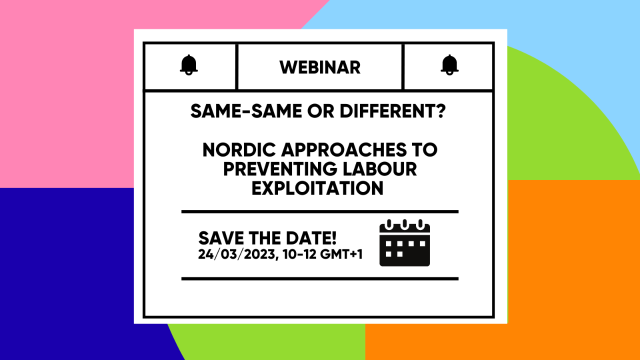10-12 Swedish/Danish/Norwegian time, 11-13 Finnish time
Online
Preliminary programme
Introduction
• Nordic approaches to the prevention of labour exploitation - Policies in Denmark, Finland, Norway, and Sweden
Dr Marlene Spanger, Associate Professor, Aalborg University, Denmark
• Analysis of police investigations of human trafficking for forced labour and human exploitation in Sweden
Dr Isabel Schoultz, Associate Professor, Head of Department, Department of Sociology of Law, Lund University, Sweden
Low conviction rates for human trafficking in general, and for forced labour and other form of labour exploitation is an international phenomenon. Sweden is no exception. The presentation is based on an analysis of more than 200 police investigations of human trafficking for forced labour and human exploitation for forced labour or work under obviously unreasonable conditions. With descrtiptive statistics over the outcome of criminal investigations we can show that there is very limited protection in criminal law for exploited migrant workers. With that as a point of departure the presentation will also include a discussion on some typical cases with similar features in terms of how victims were recruited, the forms of exploitation they reported as well as the trajectory of the investigations.
• How come Finland has so many more criminal court cases and convictions for labour exploitation compared to the other Nordic countries?
Anniina Jokinen, Senior Programme Officer, European Institute for Crime Prevention and Control, affiliated with the United Nations (HEUNI), Finland
The presentation examines how the courts in the four Nordic countries (Finland, Sweden, Norway and Denmark) have qualified and understood trafficking for forced labour based on a qualitative analysis of judgements. Annina Jokinen’s analysis will focus on the Finnish cases and the understanding of forced labour by the Finnish courts. This part of the webinar will also explore some of the reasons why the Finnish courts seem to process more labour exploitation cases in comparison to Swedish, Norwegian and Danish courts.
• On the emergence of a new framework for understanding labour relations and the fight against work related crime
Dr Synnøve Økland Jahnsen, Researcher, Fafo, Norway
The language we use to talk about crime in the labor market is changing. In the last decade's we have observed an increase in the use of terms such as "work related crime", "working life crime", "labor market crime", "work environment crime" and abbreviated "a-crime" as synonyms to describe new forms of crime and crime fighting. This presentation is based on an exploratory study of this linguistic change and links it to the emergence of a new framework for work-life regulation in Norway. We show that the new conceptual apparatus is successful in the sense that it has attracted support across organizations such as the Labor Inspection Authority, The Norwegian Tax Administration, Norwegian Labour and Welfare Administration and the Police, but also that the new linguistic framework has worked unifying across the political elite.
The presentation is based on an analysis of data sets consisting of media texts and national governing documents and identify major changes in the language. Methodologically, the article is grounded in corpus-assisted discourse analysis, where keywords are used as an analytical pivot for qualitative and quantitative analyzes of the material, in order to identify trends in the field.
• Conclusions and recent policy developments in the Nordic countries
Dr Natalia Ollus, Director, European Institute for Crime Prevention and Control, affiliated with the United Nations (HEUNI), Finland
Discussion
To register, please click on the link below and complete the online registration form: https://link.webropolsurveys.com/S/DBCACD6AFF4D0C78
Contact person:
Aleksandra Anikina, HEUNI Communications officer, [email protected]





